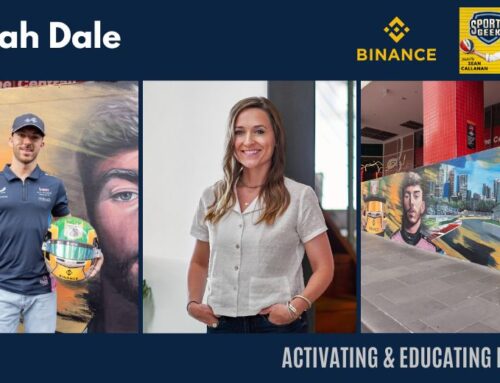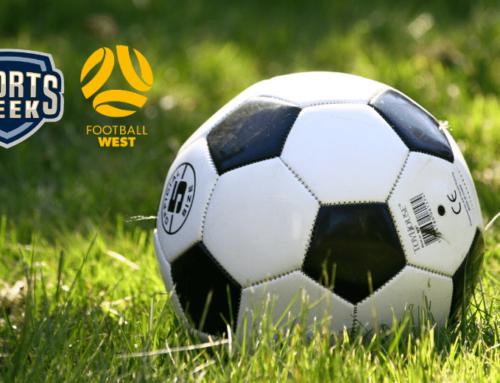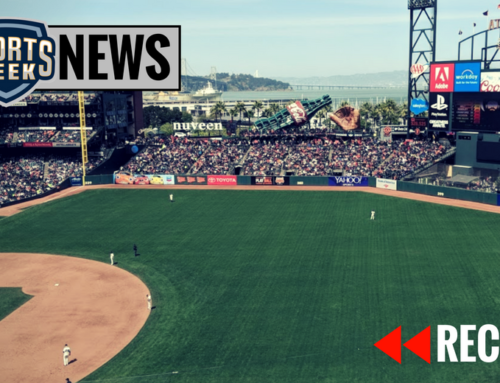In today's ABC Grandstand sports digital segment we looked at the ambush marketing in the Olympics & problems with stadiums with smartphones.
Ambush Digital Marketing
We discussed the steps the LOCOG have taken to try & protect sponsors at the 2012 Olympic Games. They have partnered with Twitter & Foursquare to try to stop ambush marketers trying to jump the queue over official sponsors.
Adidas has paid over £100m to secure the official rights, but look at what Nike is doing with it's #makeitcount campaign.
 Stadium wi-fi a global sports problem
Stadium wi-fi a global sports problem
Following on from our discussion on how much we use our smartphones at stadiums in previous weeks we also discussed the “who pays” debate when it comes to in stadium wi-fi.
Good report from Sports Business Daily citing a six figure price tag to keep Giants fans connected at AT&T Park.
Livestrong Park a great example of the new standard in world stadiums lucky enough to be built upon technology infrastructure to allow high tech integration. I was luck enough to listen to & meet Robb Heineman who is the CEO of Sporting KC, not a bad place to work.
I know MCG & ANZ Stadium are working hard with telcos & wi-fi providers to help improve the digital experience at game, but is does come down to who pays for the service.
Sports Geek Medals – #atsyd edition
Spent the week in Sydney participating as a speaker & delegate at ad:tech Sydney, some great insights in to how different industries are using digital to connect with customers & consumers.
Best find of the week was from Chris Erb from EA Sports, who revealed that the Pope plays FIFA on the Wii.
I was lucky to have three talented sports digital guys join me to present case studies in sports.
Bronze – Rob Squillacioti
Talked about the digital transformation of the FFA to open up the lines of communication with fans (and ongoing project).
Follow @robsquilla
Silver – Michael Briggs
Talked about the Wallabies One Team strategy to leverage the water cooler conversation of the RWC to connect passionate & casual fans.
Follow @mick_83
Gold – Matt Baker
Showed how the Canterbury Bankstown Bulldogs did deals with movie moguls James Cameron & George Lucas to run Avatar & Stars Wars themed Games.
Follow @mogulmatt
Until next week
Catch it live on Saturday mornings (at 7:40am) when Sean Callanan discuss sports digital with Francis Leach & Amanda Shalala on ABC Grandstand.
Tune into ABC Grandstand Breakfast over the Friday through Monday on ABC Grandstand digital radio.
Follow @saintfrankly
Follow @abcgrandstand
Get the Sports Geek podcasts
Want to get these clips in podcast form? Subscribe here or Add to iTunes
Podcast transcription
FRANK: Well Sean Callanan’s the same. He’s our digital Sports Guru. He joins us each Saturday morning to talk sport in the digital world. How are you mate?
SEAN: I’m good, thanks. It’s been a busy week in the sports digital world.
FRANK: What’s been happening? The Olympics are on the horizon, and is the digital space the new sports battle ground, particularly when it comes to the big money.
SEAN: It is. There was an announcement this week that the Olympics have brought in, put their arm around Twitter and put their arm around Forrest Greg’s head. Help us out, then suffer.
FRANK: That’s enough to make me feel a little bit uncomfortable, Amanda.
SEAN: And stop ambush marketing. And so, to a certain degree Twitter and Facebook, although they’re getting bigger and bigger, are still relatively start-ups, and so they want to cozy up to the big base that is the Olympics, but eventually money will talk and really there’s not much Twitter and Forrest Greg can do if a big brand like a Nike wants to run a really successful campaign that’s driven by their athletes and driven by the people. So, yeah, it’s definitely a ground for ambush marketing. You know, Nike’s running out—they’re really pushing hard into digital at the minute. They’re running a campaign called Make It Count, and they’re running with all their athletes, so they’re trying to bring in policies around protecting the sponsors, but when the fans of athletes are jumping on board and you do a campaign that can go viral, we talked about Kony 2012 and how it went viral. If Nike can produce Greg videos than the people that have paid the money, in this case Adidas had paid over $100 million to be the official partners of the Olympics.
FRANK: That’s a lot of money!
SEAN: It is a lot of money, and so it’s now a matter of making sure that they can deliver, so really Adidas has to pour a lot of money into digital to make sure that they protect their space from a mentions and conversation point of view. I mean it’s not new. I remember in 1992 when Magic Johnson and Michael Jordon put a towel over their tracksuit because it was a Reebok, and they obviously had competing shoe deals, so ambush is not anything new to the Olympics, but, yes, from a digital point of view, they don’t really have as much control as they do from a TV and a media standpoint.
AMANDA: Well in the digital sphere what do you think some of the most effective strategies are in trying to combat that sort of gorilla marketing?
SEAN: Well, really, you’ve got to go out and fight fire with fire. You’ve got to match the Nikes of the world with a really good campaign that is going to engage an audience. You really can’t, you can’t be in that passive mode, and that’s pretty much what an Olympics sponsorship to a certain degree might’ve been. It’s not enough just to have the logo on the jersey or on the field. You’ve got to participate and amplify what you’ve been doing. So that’s where, in this case, we’re talking about Nike versus Adidas. Nike’s going and they’re calling their campaign the 2012 campaign. Is that associated with the Olympics, no. They’re just making it their yearly campaign. Is there a site association with the Olympics? Are there more Olympic athletes in their campaigns? Yes there is, so Adidas needs really needs to make sure that it can leverage its partners and its association. Obviously, the Olympics need to develop a bit better digital presence from a website point of view because it’s so TV focused at the moment. They need to have a destination for the fans to go, and that’s where advertisers and sponsors can get a little more lift.
FRANK: But this is where it’s fascinating for the Olympic games because they have locked down so tightly on access to information and to content, so you know, for instance, Amanda and Sean, if you owned the rights on it and you want to play a little bit of an Olympic event, say someone wins a gold medal, you can only I think take about seven or eight seconds of the event and play it, so they’re trying to lock that down, and when it comes to the digital media and social media, that’s like hurting butterflies. You can’t do it. So their mentality doesn’t really, I think, allow them to actually conceptualize what digital media and social medial are about and then use it effectively.
SEAN: And it’s been so TV focused, so they’re really focused on protecting the rights holders. NBC paid a lot of money in the U.S. and they’re trying to protect that TV audience. But four years is a long time in digital and the audience has changed and is moving. They are looking to do a lot more stuff with YouTube, but, yeah, they’re sort of playing catch up in that they’re only really running their event every four years. So major events, like the Rugby World Cup, the Soccer World Cup, the Olympics have to really assess what they’re doing from a digital point of view a long way out, and so they’re trying to bring in the social media platforms to say, ‘Help us out here,’ but I’m sure if someone went to those platforms and said we’re going to spend a whole lot of cash on your platform, I know where the twitters and Four Squares will go; they’ll go with the cash.
AMANDA: Now, Sean, one of my big bug bears is when you go to a big sporting event and you can’t get internet access. What our stadiums trying to do about the issue of getting WIFI for fans to be able to use?
SEAN: Well, yeah, and that’s going to be, again, a messy problem for the guys at LOCOG and the Olympics because the problem with stadiums is first of all they’re built to block your phone. There’s concrete and steel everywhere, and then you have a concentration of people, and smartphones are automatically draining the bandwidth that’s available, even if you’re not taking your phone out. We’ve discussed whether you’re tweeting or not, just actually having a smartphone in your pocket it’s automatically starting to drain the bandwidth as people have pushed notifications and messages are coming through. And so it’s a constant problem for all the people who are building the stadiums and people running the stadiums. AT&T Park, which is San Francisco Giants, has a very savvy tech savvy park.
FRANK: Magnificent, I’ve been there many times. Magnificent sports venue.
SEAN: And they’ve had WIFI in their stadium, which has been partly sponsored and run with partners, but it’s upward of six figures to keep that WIFI up and running, so you can see the challenges that the MCG and the ___ Stadium have in trying to deliver WIFI, and so what it’s now coming down to, the people who are building the stadiums to actually integrate the technology into the stadiums.
FRANK: Has anybody been able to do it successfully yet?
SEAN: So one that has done it successfully, and I actually just saw Rob __ from Kansas City actually tweet a picture of Livestrong Park, and it was fortunate when they built it, and they built it to be a really technology savvy park. But Google’s also running their version of the NBA and so they effectively put the hub under the stadium, so the best place to get WIFI and get into that kind of activity is actually at Livestrong Park. Maybe if the Telcos, when they’re rolling out the MBN to sort of base out of the stadiums. It makes sense. That’s where it’s obviously going to be the hot point of any traffic in Melbourne if you put it in that Olympic park precinct it might actually make sense. But it is a constant challenge, whether the fans want it for free. The sponsors want some value for it. Are you going to look at an ad because you can get WIFI? Will it come down to potentially giving over data? If you hand over your email address and marketers can email you about it, will that be enough to get you free WIFI?
FRANK: Sean Callanan is with us, our Sports Geek, and remind people where they can find you on Twitter, Sean.
SEAN: @Sportsgeekhq or @SeanCallanan or sportsgeek.co.au.
FRANK: Talking about sport and the digital world, just on that, I mean, the AFL is just pouring an absolute fortune into its own media company. It’s supposed to be taking to media in house.
SEAN: It’s gone from 15 people to 120 people in the last three minutes.
FRANK: I think that tells you everything you need to know about what they’re trying to do. So surely they are wanting to own a huge real estate in this space, and if they’re doing that, surely they’ve got to provide the infrastructure at their venues to deliver their own content. I mean it would be ridiculous to have all these people banging away on computers and tweeting away and then when you get the game done you want to be at the ground you can’t read anything that they’re writing.
SEAN: Well that is a concern that they have to provide, but it is a problem between venue operators and that’s where it’s different in the States to Australia. A lot of the teams in Australia are just tenants and are just renting out the venue for the day. So it’s really the venue operator’s issue. In the States, obviously, stadiums get built for teams. Teams have a bit bigger say in the stadium, so that’s, with the MCG for example, you’re working with the trust. You’re working with the MCC, so it’s a delicate thing. It comes down to who pays for it. So potentially, AFL might have to foot that bill.
AMANDA: Sean on the podium this week you’re looking at people who live in different sporting organizations and using the digital world quite effectively, who’s made your 1, 2, 3?
SEAN: Yes, I pretty much give these medals out because these guys helped me out this week at Adtech Sydney on my panel talking sports digital. That was a pretty good week. I actually found out from the EA Sports marketing VP that the Pope plays FIFA on the WII.
FRANK: Which team does he choose?
SEAN: So, I didn’t find out his handle, so just keep searching. If there is a handle on the FIFA called the Pope, you might…so the bronze went to Rob Squillacioti, @robsquilla who’s from the A-league and actually talked about how the A-league is moving to that same model as the AFL and improving the communication with their fans, which is an ongoing project. @mick_83, or Michael Briggs from ARU talked about how the Wallabies were developing their relationship of the Rugby World Cup and met Matt Baker or @mogulmatt on Twitter. He took the gold medal for getting Darth Vader to turn up to a game for the Bulldogs and actually got approved by George Lucas, so good work!
FRANK: That is a good one. Get on there Sean. Good day of you to talk to us again. We’ll catch you next week.
SEAN: All right guys.
FRANK: Sports Geek and digital media expert, Sean Callanan, with us here on Grandstand Breakfast.




